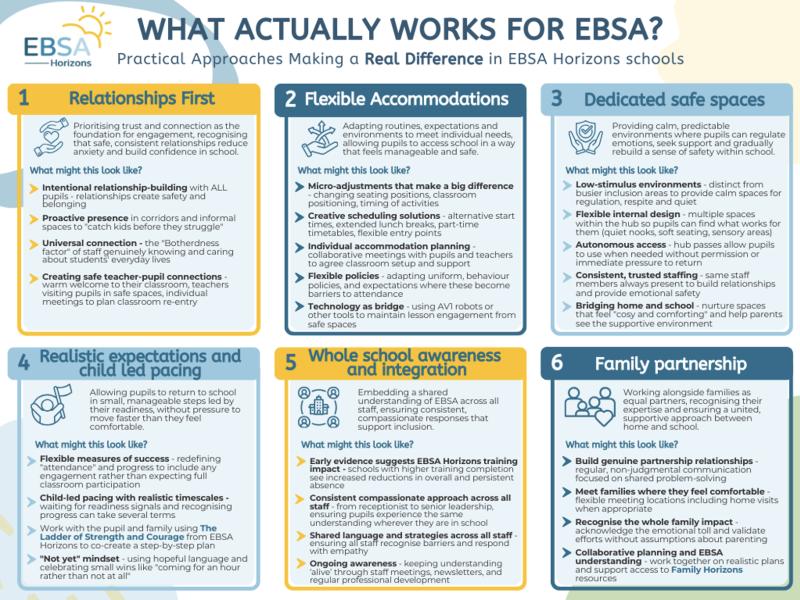Creating Consistent EBSA Responses: A DSL's Role in Whole-School Training

You've started using EBSA resources with individual vulnerable children in your caseload. You're likely seeing positive responses - but you've probably also noticed something: the most effective support happens when your entire school team understands these approaches. Individual understanding helps individual children, but vulnerable children need systemic support. When only a few staff members recognise EBSA as emotional distress, vulnerable children face an inconsistent experience - compassionate responses from some adults, but approaches that inadvertently increase anxiety from others.
When your entire school community recognises emotional distress behind attendance struggles, these children experience the consistency that allows them to feel genuinely safe.
What Actually Works: Evidence from EBSA Horizons Schools
Schools that have implemented comprehensive EBSA training consistently report six key practices that improve outcomes for vulnerable children:

These aren't theoretical concepts - they're practical approaches making a real difference in schools where whole teams understand EBSA. From relationships first and flexible accommodations, to dedicated safe spaces and realistic expectations, schools shared with us what was working in their own schools and the impact this was having across their schools culture and pupil wellbeing and attendance. Creating genuine family partnerships is particularly crucial for DSLs working with vulnerable families. EBSA Horizons includes Family Horizons access for all families, ensuring parents and carers have the same evidence-based understanding, creating consistency between home and school approaches.
From our case studies implementing EBSA approaches, we've seen that individual staff using these methods help individual children, but vulnerable children need consistent responses across their school experience. In schools where only some staff understand EBSA, we've observed children getting mixed messages - compassionate support from trained staff, traditional behaviour management from others - which can increase anxiety rather than reduce it.
The difference we are seeing: while individual staff members using EBSA approaches can help some children, whole-school understanding creates more systematic change; increased staff confidence and sustained attendance improvements.
When is whole-school EBSA training worth considering?
As a DSL, you're uniquely positioned to champion this whole-school approach. You understand these children's complex needs better than anyone, and you can articulate why consistent, relationship-first responses matter for their wellbeing and safety.
When your entire team understands that school avoidance often stems from emotional distress rather than behavioural choice, vulnerable children experience the consistent understanding and support they need to thrive. The reception staff greets them with warmth, teachers recognise early signs of distress, and support staff respond with compassion and understanding.
This systematic understanding doesn't just improve attendance - it creates the safe, predictable environment that vulnerable children need to feel safe and learn.
Your EBSA Starter Toolkit
Over the previous blogs, we've explored four key resources: the "What is EBSA" video for staff training, the CATS checklist for collaborative parent engagement, the Risk and Resilience Profiles for systematic assessment and EdPsychED's strategy grids that provide evidence-based interventions organised around three key areas: child-focused, home-focused, and school-focused factors. These tools provide an excellent starting point for understanding and supporting vulnerable children experiencing attendance difficulties.
Ready to Build Whole-School Understanding?
Safeguarding Network has partnered with EdPsychEd to offer our members discounted access to EBSA Horizons - comprehensive training that helps entire school teams develop the consistent, relational approaches to improve engagement, attendance and wellbeing for our most vulnerable children.
Safeguarding Network is offering members and blog readers discount of up to £200 off EdPsychEd’s School Training resources.
EBSA Horizons Training is a comprehensive CPD course on Emotional Based School Avoidance by specialist EP, Dr Jerricah Holder, which develops our understanding and skills to support children and young people experiencing difficulties attending school.
Click on the offers for more information. Discounts have been automatically applied.
Whole School Licence
Whole School and Family License
LEARN MORE ABOUT EBSA HORIZONS SCHOOL TRAINING AND JOIN TODAY
Terms and conditions:
Offer ends 31 December 2025
By using these codes you confirm that you are happy for EdPsychEd to share your purchase details with Safeguarding Network.
If you use a member voucher you confirm you are a paying member of Safeguarding Network.
Free Webinar: School Wellbeing and Attendance: Creating a Compassionate and Child-Centre Approach - 2 December 2025
Through this webinar, Dr Jerricah Holder will provide an overview of the school wellbeing literature and key psychological models essential to understanding the needs of children who find it difficult and distressing to attend school. Moving away from the language of school refusal and with increased emphasis on a more compassionate and child-centred approach, Dr Jerricah Holder will share her ‘Integrated Model of EBSA’ enabling Designated Safeguarding Leads to develop a greater understanding of the complex and often multi-faceted aspects of school avoidance behaviours. The child and family perspective will be integrated throughout, with videos of children and parents sharing their journey.
About EdPsychEd
EdPsychEd offer a comprehensive CPD course with associated resources to support your setting’s work with Emotional Based School Avoidance. Their Horizons training takes a tiered approach to building your staff understanding of EBSA in an eLearning format with child-friendly assessment resources to support your work with students.
Effective work around attendance involves and empowers students and their families. At the request of local authorities EdPsychEd developed a learning and resource series for families to follow to improve their understanding and approach to reducing Emotional Based School Avoidance in their children.
If you would like to discuss EdPsychEd's offering please contact Dr Jenny Dutton directly, here.
Sign up for our free safeguarding Bulletin
Interested in membership?
Join over 3,500 DSLs and nearly 40,000 staff in 1,500 education settings receiving high value support, consultancy and the tools you need to keep the children in your care safe.
Shopping cart
Action Required
